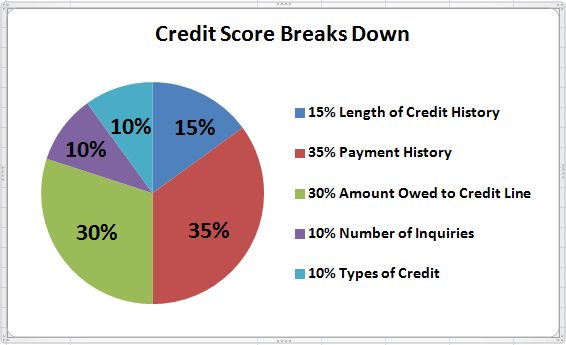Part 19:
As part of series of articles (blogs)
regarding Credit and Credit Score, here we
go:
 Disclaimer:
Disclaimer:
Every effort has been made to make these
articles as complete and as accurate as
possible, but no warranty or fitness is implied.
The information provided is on an “as is” basis.
The author shall have neither liability nor
responsibility to any person or entity with
respect to any loss or damages arising from the
information contained in this book.
The author is not engaged in professional
services. If professional advice or other expert
assistance is required, the services of a
competent professional person should be sought.
For so many years it was a secret as to how
credit scores are derived or even calculated.
Though not all criteria’s and calculation
algorithms are the same for all credit scoring
companies, nor are all known even now, however
there is enough information available to show
what makes up a credit score and how much weight
each category of activity will have on the score
to come up with tips and tricks on how to
improve your score.
Account history is
deriving your credit score. Below we have
categorized account history information
according to the way it impacts your credit
score:
Figure 1: Credit Score
Break Down Chart

1.
Payment History: 35% of your credit score
Payment history measures how you have paid your
debts. It accounts for many factors such as:
number of times your accounts have been paid on
time, were late, have been charged off; types of
loans; etc…
·
Number of times and period of time in which you
were late for 30 days, 60 days, 90 days, or 120
days.
TIPS: A 90-day late payment has more
negative impact on your credit score than a
60-day late payment, etc.
·
Number of accounts and the amount of your
account that went to collections.
TIPS: The number of accounts in
collection (now or in the past) is more
important than the dollar amounts. For example
three accounts in collections with balances of
$1000, $450, and $120 has more negative impact
on your credit score than one account with a
$2000 balance in collection,
·
Number of accounts and credit limits of accounts
that creditors have closed your accounts,
written off or settled with less than the full
amount.
·
If you voluntarily close your account, it still
will have some negative impacts on your score.
Don’t close your account, if you don’t have to.
·
Closed accounts or settled accounts with less
than the full amounts could have a major
negative impact on your credit score, especially
with a Mortgage loan type. If it is reported
that a Mortgage loan settled with less than the
full amount, it means you had a “Short Sale”
which would have a major negative impact on your
score and lender’s decision.
TIPS:
So, if you are negotiating to pay a portion of
your debt to close the account, or you have to
go through a Short Sale or Foreclosure, make
sure to ask the creditor to (if you can) report
them in credit bureaus as “Paid in full”, “Paid
as agreed”, “Paid Satisfactory”, and/or get a
release of Judgment when applicable.
·
Types of accounts (e.g., Medical bill vs. Credit
Card charge, vs. Mortgage loan)
TIPS: Payment history of a Mortgage loan
has more of an impact than Credit Card Charges,
which in turn has more weight than Medical
Bills. For example, a $10 credit card collection
account could have more of a negative impact on
your credit score than an $800 medical
collection.
·
TIPS:
Repossession, Foreclosures and Short
Sales in Real Estate Accounts have major
negative impacts on your credit score. Try to
avoid them and work it out with lenders as much
as possible.
·
How recent the accounts were late or unpaid
(e.g., 1 month ago vs., 3 years ago)
TIPS: Please note that the recent late
accounts have more of a negative impact on your
score than an older late account, regardless of
the amount. For example, a one-dollar ($1)
60-day late fee that was reported to credit
bureaus two months ago has a much more negative
impact on your credit score than an $800, 60-day
late fee that was reported 20 months ago.
Please note that, though some of the items shown
on the previous two pages might be unrecognized
by scoring algorithms at this time, lenders and
underwriters will look at them carefully and
that information will have an impact on their
decisions.
Example of this case could be a “short sale”
scenario, in which at this time there is no
specific code or flag assigned for it in the
credit reports. However, lenders and
underwriters, by reading the comment “the
account was settled for less
than the full amount”, know it was a
“short sale” and will take necessarily actions.
 HOW to overcome the problems with your credit
history and credit score?
HOW to overcome the problems with your credit
history and credit score?
Knowledge, education, awareness, practice and
discipline are the essential keys to being
successful on any subject. The book,
"Credit Score Tips and Tricks",
provides you information, tools, techniques to
educate yourself and manage your credit report &
credit score, and therefore manage your finances
effectively at no additional cost.
I have decided to bring and share with you,
chapters or sections of my book,
Credit Score Tips and Tricks,
as series of
articles here. This is the number
19 of such a
series.
I also created and manage a GROUP in ActiveRain,
Credit Reports and Credit Scores, Please
feel free to join and share your thoughts and
experiences.